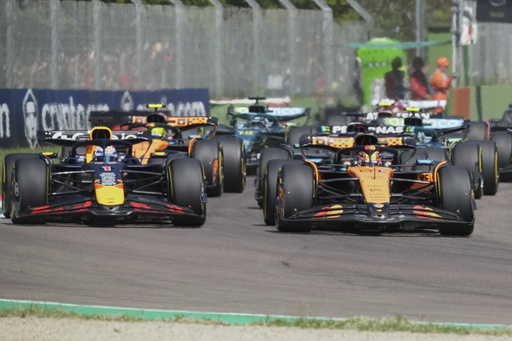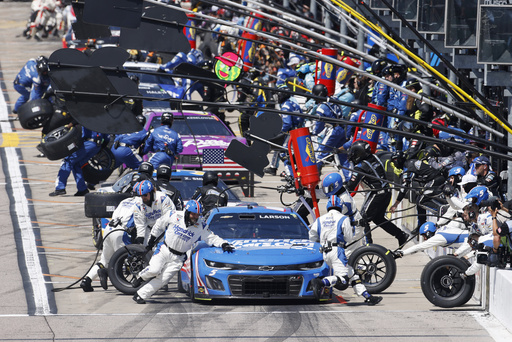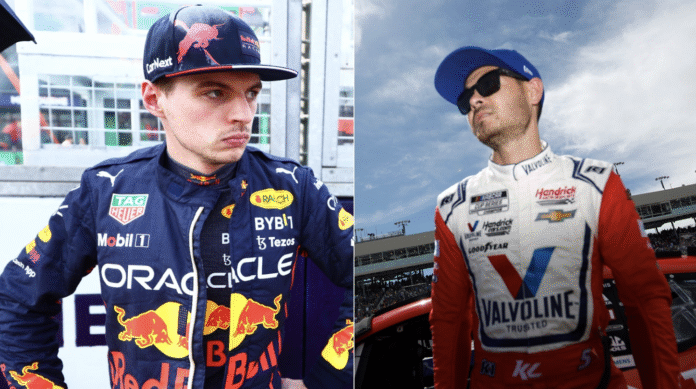Keypoints Summary
- Verstappen NASCAR challenge sparks buzz as Jeff Gordon gives his take
- F1 champ would face brutal learning curve, says Gordon
- NASCAR’s physical demands and racing style differ dramatically from F1
- Gordon praises Verstappen’s instincts but questions short-track readiness
- Fans light up social media imagining the motorsport crossover
Verstappen NASCAR Challenge: Jeff Gordon Delivers a Reality Check
Buckle up—because the Verstappen NASCAR challenge is picking up speed, and Jeff Gordon just slammed the gas pedal.
The four-time NASCAR Cup Series champion didn’t hold back when asked how Formula 1 superstar Max Verstappen would fare if he crossed the pond and took on the American oval.
His answer? A mix of admiration and brutal honesty.

“Max has world-class talent, no doubt,” Gordon said. “But NASCAR is a beast. It’s loud. It’s physical. And It’s unpredictable. You’re not just racing the track—you’re wrestling the car, the heat, the pack, and the politics.”
Translation? Verstappen might be king of the grid, but he’d need to survive a baptism by asphalt in stock car chaos.
Let’s be clear—this isn’t fantasy anymore. With F1 drivers dabbling in IndyCar, Le Mans, and virtual NASCAR series, the motorsport worlds are colliding more than ever. So naturally, the question comes up: What if the best in F1 took on America’s toughest tracks?
And when it’s Max Verstappen we’re talking about, the stakes rise.
He’s fearless. He’s calculated. And He’s ruthless on the wheel. But could he handle Bristol’s bump-and-run? Or Talladega’s three-wide madness at 200 mph?
Jeff Gordon doesn’t doubt Max’s raw talent—but he’s very clear: success in NASCAR wouldn’t come easy.
Gordon’s Breakdown: Why NASCAR Is a Whole Different Animal
To fully grasp Gordon’s take on the Verstappen NASCAR challenge, you have to understand the brutal world that is NASCAR.

Jeff Gordon spent decades grinding it out on tracks where one mistake doesn’t just cost you pole position—it totals your car. Unlike Formula 1, where aerodynamics and precision rule, NASCAR is about body-to-body combat, tire management, and keeping your cool in bumper-to-bumper chaos.
“Max would get punched in the mouth early,” Gordon said bluntly. “Not literally—but the track does that. You don’t get to ease in. You get thrown into it. Lap traffic. Radio noise. 500-mile endurance.”
And the learning curve? Steep.
Verstappen is used to ultra-responsive machinery and surgical track layouts. But in NASCAR, it’s about adapting to heavy cars, limited grip, and unpredictable pit stops.
“You miss your mark in F1, you lose a tenth. In NASCAR, you miss your mark, and somebody’s in your door,” Gordon added.
Still, the veteran racer believes Verstappen could find his rhythm.
“Give him six months. Get him on ovals. Teach him tire conservation. If he humbles himself early and learns from veterans, he could absolutely win,” Gordon said.
But he was quick to add: “It’s not plug-and-play. Max would need to bleed a little first.”
How Would Verstappen Approach the NASCAR Switch?
Max Verstappen isn’t exactly known for taking the slow route. So if the Verstappen NASCAR challenge ever became real, expect Max to dive in at full throttle.
He’d likely start with simulation runs, followed by testing at key tracks like Charlotte and Martinsville. Then come the practice laps under real race conditions—short tracks, road courses, and superspeedways.
Verstappen’s adaptability would be his secret weapon. He’s shown time and again that he can drive anything with wheels. Whether it’s wet, dry, or wild—he adjusts.
But there’s also a psychological hurdle.
Max would need to unlearn years of F1 reflexes. No more DRS zones or radio coaching for every sector. In NASCAR, you rely on instinct, seat feel, and raw awareness.
And then there’s the pack.
In Formula 1, Verstappen fights for inches. In NASCAR, he’d be fighting for survival. The contact is real. The stakes are brutal. And even the best get caught in the carnage.
“He’s got the fight,” Gordon admits. “But he’d have to reset everything he knows.”
Fans React to the Idea: “We Need This”
Motorsport fans wasted no time weighing in.
The Verstappen NASCAR challenge became instant clickbait across racing forums, Reddit threads, and social platforms.
Some begged for a crossover:
“Verstappen vs. Kyle Larson at Bristol. Let’s GO.”
Others were skeptical:
“Max is amazing—but I give him two laps before someone punts him into the wall.”
One fan summed it up perfectly:
“Verstappen in NASCAR would be messy, intense, and absolutely awesome. He’d either dominate or detonate—and I’m here for both.”
Even NASCAR drivers chimed in.
Denny Hamlin tweeted, “If Max wants a seat, we’ve got one waiting. Let’s see what he’s made of.”
The hunger for crossover chaos is real—and growing.
Would Verstappen Survive NASCAR?
The Verstappen NASCAR challenge is more than a fantasy. It’s a question that tests the limits of motorsport greatness.
Could the fastest man in Formula 1 handle the most brutal tracks in America?
Jeff Gordon thinks he could—but not without scars.
The raw talent is there. The fearlessness is undeniable. But NASCAR humbles everyone. Even legends.
Would Max rise? Would he rage? Or would he wreck trying?
Either way, we need to see it.
Verstappen’s Record of Ruthless Success Speaks Volumes
To understand the weight behind the Verstappen NASCAR challenge, you first have to appreciate what Max Verstappen has already accomplished in Formula 1. And it’s not just success—it’s dominance.
Verstappen isn’t just a champion. He’s a record-breaker, a history-maker, and a one-man wrecking ball tearing through the F1 grid. With multiple world titles under his belt and more than 60 Grand Prix wins before turning 27, Verstappen has redefined what peak performance looks like.
He holds records for most consecutive wins in a single season and boasts the highest win percentage in modern F1 history. His control of the Red Bull Racing machine is surgical. His mental game is ice-cold. He doesn’t just race—he erases the competition.
Rivals fear him. Engineers trust him. Fans worship him.
He can win from pole. He can win from mid-pack. And He can win in rain, on soft tires, or while radioing complaints about tire degradation. And still—he delivers.
Verstappen’s brilliance lies in his total mastery of the car and his refusal to back down. Whether he’s fighting Lewis Hamilton wheel-to-wheel or cruising to a 30-second lead, he brings the same hunger. The same rage. The same refusal to lose.
So when Jeff Gordon says Max could make it in NASCAR, that endorsement carries weight. Because greatness doesn’t disappear—it adapts. And if Verstappen brings even half of his F1 fire to a stock car, NASCAR might never be the same.
The real question isn’t if Max could win in NASCAR. It’s how long before he does?




